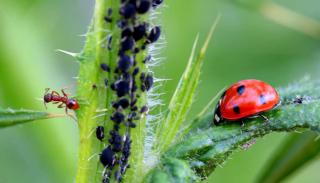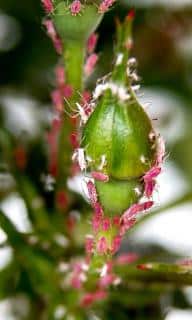What are Aphids and how to get rid of them?

The content of this article was prepared by Nature and Garden and has been revised and republished by FreshFruitPortal.com.
Key facts about aphids
Name – Aphidina
Common name – aphid
Appears in – spring, summer, fall
Favorable conditions – most plants might be attacked, but the weakest plants are the most vulnerable.
Having a garden brimming with insects, especially ladybugs, greatly helps control aphid populations.
Regular treatments against aphids will help you consistently eliminate them and keep them away from your plants and rose trees.
Effective organic aphid treatments
 Aphids attack many plants, rose trees and fruit trees in our gardens, and they can do considerable damage.
Aphids attack many plants, rose trees and fruit trees in our gardens, and they can do considerable damage.
The following treatments can help fight aphids, and if one particular strategy doesn’t seem to work, you can apply several solutions together. Associating repellent plants and treatments is most effective.
Ladybugs & other predator insects
- Since ladybugs eat aphid larvae, they naturally contribute to controlling aphid populations. This method is increasingly practiced by professionals who manage parks, and it is 100% organic.
- Other common insects also devour aphids: green lacewing, hoverfly…
Fermented stinging nettle or fern tea
- It is sold now in horticulture stores but can be produced naturally too.
- It is an excellent 100% organic way of fighting aphids.
- Learn to make your own fermented stinging nettle tea.
Fermented rhubarb tea
- Easy to prepare as early as April with fresh rhubarb leaves, here is our fermented rhubarb tea recipe.
Soapy water
- Made with Marseille soap or beldi soap dissolved in water and sprayed on the plant, this soap mix makes it hard for aphids to stick to leaves.
- Grate 5 oz (150 grams) of soap and dissolve it in 1 quart (1 liter) water, add and mix in 1 tablespoon vegetable oil. Spray on plants.
Aphid repellent plants
- Planting aphid-trapping plants such as nasturtiums or aphid repellents such as French marigold and above all lavender naturally helps control aphid populations (French lavender works, too).
Fighting ants
- Fighting ants is necessary when they have established their nest.
- Ants attract aphids and fuel their spread.
- Here are good techniques to rid your garden of ants.
Aphidoletes larvae
- These are excellent aphid predators, but they are only active from 60°F (16°C). They are rarely sold in horticulture stores.
Pyrethrum
- Products derived from this plant can be used in organic farming. This is one of the main ingredients in aphid-control products sold on the market. It is very effective and will mercilessly annihilate these parasites.
Flowered lawn
Special flowered lawn mixes are prepared these days, which repel most parasites and specifically aphids when the combination of flowers start to bloom.
- This flower lawn mix can be sown in gardens and in the vegetable patch to protect vegetables.
Finally, a basic rule is to reduce use of chemical products as much as possible.
They usually wreck havoc in the local ecosystem, and weaken natural defenses that usually make plants immune to diseases and parasites.
Learn more about aphids
- All chemical treatments have heavy impacts on our environment, so think of the planet and use organic aphid treatments!
- Plant species that are routinely attacked by aphids include of course rose trees, but also whole trees such as lime trees or basswood or spruce and also certain fruit trees like the pear tree, peach tree or cherry tree.
- Watch for leaves turning black as soot, this matches symptoms of sooty mold, which is a direct consequence of an aphid invasion.
Smart tip about aphids
Most damage occurs during the growth or vegetation phase, specifically in spring and at the beginning of summer. This is when treatments are most needed and effective.
Green aphids (also on social media) by Joseph Holt under © CC BY-NC-ND 2.0
Aphids with ladybug & ant by Myriam Zilles ★ under Pixabay license
Aphids on flower by Rainer Berns under Pixabay license



































